Funny Things That Australians Say to One Another
Comedy writer Rob Cohen's IMDb page lists all of the TV shows and comedy specials he's written for, including The Big Bang Theory and The Ben Stiller Show. It also states that he's from Calgary, Canada. It's a small detail, but it's one that is deeply significant to Cohen, as well as one that has caused a complicated combination of chest-puffing pride and deep-seeded frustration over the years. As a Canuck who's made it big in Hollywood, which he now calls home, Cohen is reminded on a daily basis of how little his American peers seem to care or even know about Canada. In an opening scene of his new documentary Being Canadian, two slightly tipsy young women in Las Vegas are asked what the capital of Canada is. After several seconds of deliberation, one of them ventures: "Arkansas!"
One doesn't get the sense that alcohol in any way hindered the woman's thought process.
Being Canadian is Cohen's attempt to educate the world–and, especially, Americans–about that vast, frequently frigid land mass whose cultural achievements and rich history are often reduced to pedestrian jokes (Did you hear the one about the Canadian Army?), and whose capital city remains a Trivial Pursuit-level stumper to a portion of the population. Like any documentary worth its name, Being Canadian is ultimately a journey, in more ways than one. To get to the bottom of his existential crisis and to "show once and for all, we're more than just igloos and beer," Cohen–a tall, amiable nerd who approaches his mission with an explorer's wide-eyed zeal–rambles across his homeland in a Chrysler minivan with a Canadian flag painted on the side. He drinks beers with locals; interrogates an "etiquette expert" on why Canadians are so excruciatingly polite; and gets fitted for a Smithbilt hat–all in his quest to understand why he and his countrymen are so underrated.
He doesn't necessarily come up with all the answers. But one thing Cohen's film does underscore is how much Canada has contributed to the world of comedy. Almost all of the interviewees in the film are comedians. Every form of comedian. People you may or may not have heard of, such as Tim Long, a longtime writer and producer on The Simpsons, to people you have definitely heard of: Dan Aykroyd, Mike Myers, Seth Rogen, Eugene Levy, Catherine O'Hara, Howie Mandel, and Michael J. Fox.
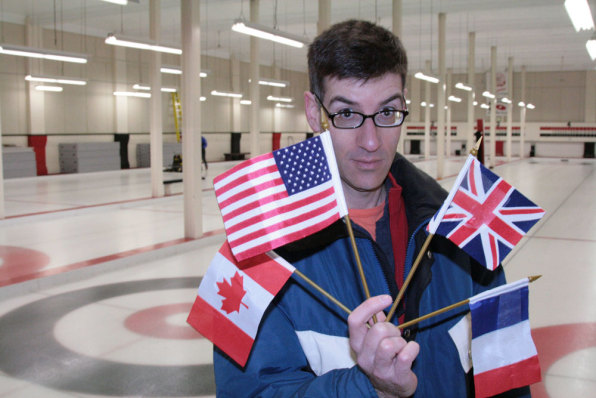
Perhaps because Cohen himself is so immersed in comedy–many of these folks are his pals–he stumbles on this realization later on in the film as he cruises through Toronto, the hub of Canada's comedy scene, where he says he went to his first live comedy show. Here he pronounces, "I can safely say that Canada is the largest square capita of comedy," noting that SCTV, The Kids in the Hall, and Lorne Michaels, the creator and executive producer of Saturday Night Live, are all Canadian products. He adds: "Looking back, I realize my place of birth may also be responsible for my chosen career."
As for why, Cohen puts the question to his subjects, asking them, "What is it about Canada that creates so many funny people?"
Here are some of the theories they came up with.
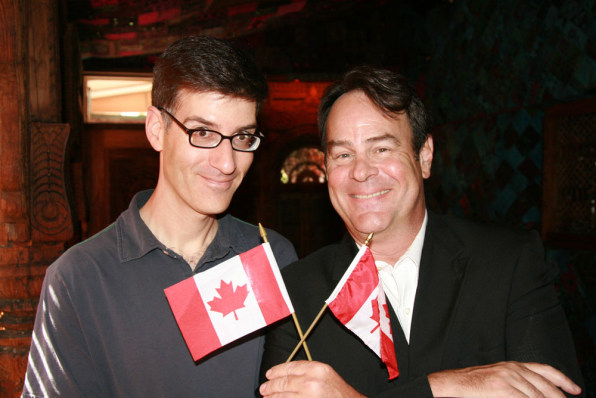
Mixed Cultural Influences
From its French and British heritage to its close proximity to the U.S., Canada's cultural identity is ultimately a composite creation; a swirl of surprising, even contradictory, influences. British manners (that niceness), French old-worldness, American music and TV. Which means that being Canadian isn't as straightforward as, say, liking apple pie, hotdogs, and baseball. (Indeed, one segment of the film is devoted to the "national wishy-washiness" of Canadian cuisine, which despite Cohen's best efforts to prove otherwise, is basically Maple syrup and doughnuts.) Many of the people Cohen talked to said they felt this hybrid effect growing up and that it shaped how they looked not just at themselves, but at the world. According to Aykroyd, "I think the average kid grew up with a mix of the British and the U.S. to make an all-rounded view of comedy and one which stressed satire–political and social–and an observant kind of view of the rest of the world."
Said Michael J. Fox: "We had access to so much stuff. I also think the British thing was a big piece of it."
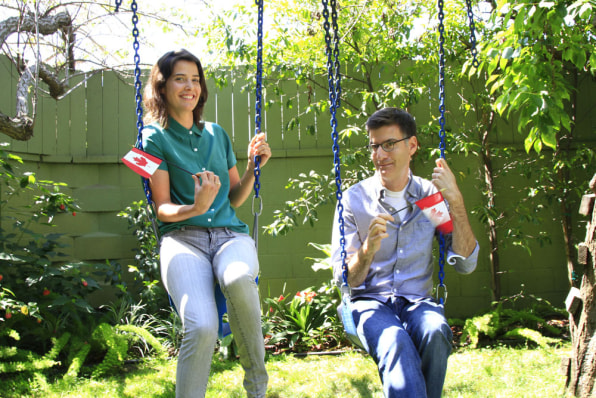
A Raging Inferiority Complex
Canada's inferiority complex makes for endless jokes, many of which make their way into Cohen's movie. In one scene with Ben Stiller–one of a few designated American commentators–when Cohen points out that Canada famously built the robotic arm on the NASA space shuttle (known as "the Canada arm"), Stiller gives him a deadpan look. "Oh, so you built the arm on the space shuttle. Not the actual arm."
But Cohen and his compatriots argue that this failure to live up to the U.S. is no laughing matter. As Alanis Morissette puts it, "We have an existential crisis of, I don't even deserve to exist."
The flip side of feeling unimportant, though, is that it makes for great comedy. It's not the glamorous alphas, after all, who are amusing to watch, or who feel compelled to find refuge in humor, it's the underdogs. "There's a definite preference for low-status type of characters," says Andrew Clark, head of the comedy and performing program at Humber College in Toronto. "I always think of John Candy or some of Dan Aykroyd's characters. These big, broad, misbehaving characters, but they're also likable, so that's partly Canadian."
Says David Steinberg: "From a comedian's point of view, if you have a touch of outsider in you, it's gonna help. That's why Jewish comedians, black comedians, Hispanic comedies, they have an advantage. They're looking at the world differently."
Then there's Kathy Griffin's point (another American interviewee), that being less full of yourself means you're more apt to poke fun at yourself. "Canadians have a much better sense of humor about themselves than Americans," she says matter-of-factly. "Hands down."
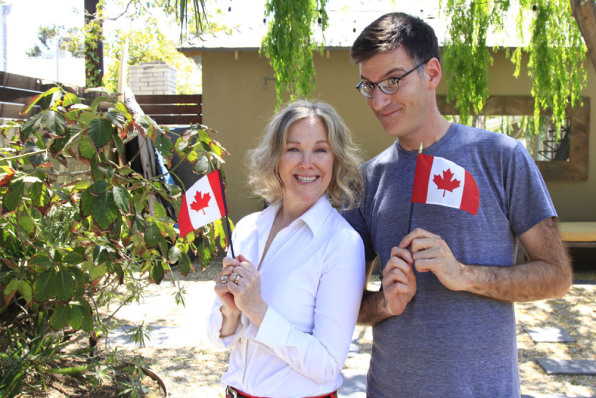
A Drive to Retaliate
But there's also a dark side to Canadians' sense of being perceived as less than their powerful neighbor. Cohen's frustration at having to deal with all the ignorance surrounding his country, and all of those "Ay?" jokes, runs throughout Being Canadian. In one scene he pretends to be a patient, "Canada," talking to a therapist about how messed up he is. As he lays on a couch, he vents about what it was like to be born to French and British parents who got divorced when he was little, and how he had to grow up next to a neighbor with a fancy house. What should he do about it? How can he cope?
The shrink has no answer.
But Cohen's interview subjects come up with one: Humor. For Canadians, they posit, comedy is a way to win, a way to one-up Americans and to create a distinct national identity.
Says Stiller: "It's like a Canadian sponge that sops up all the American paint and then throws it back in our face and says, 'Happy New Year!'"
Malcolm Gladwell puts it this way: "We have struck back at this monstrous neighbor of ours through this kind of covert hostility, humor."
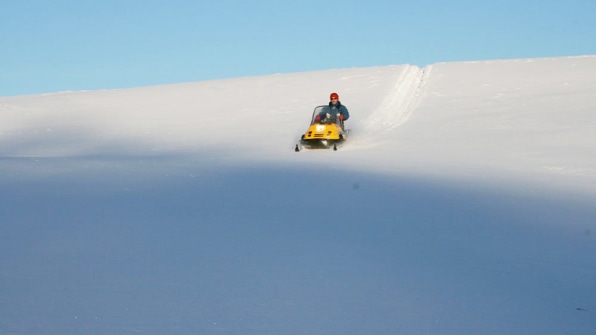
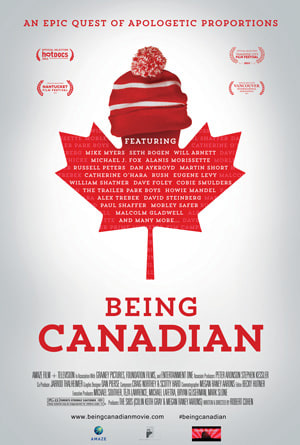
It's Cold
Perhaps the simplest and most obvious explanation for why Canadians are so funny is the weather. It's no secret that in Canada it is often cold. Very, very cold. There is snow. And ice. For months at a time. People stay indoors, where there are two options to get by: drown in misery or find something funny about the situation. Canadians, it seems, choose the latter. As Canadian TV host George Stroumboulopoulos observes: "In Norway and Sweden they have the same brutal winters we have and they come up with death metal. And we come up with comedy."
"Cold will do things to your head," says Russell Peters. "You just start to have weird thoughts. And it depends on how you harness those thoughts. I think a lot of comics are people who were very bored in the winter, who took those thoughts and went onstage with them."
The Barenaked Ladies' Steven Page adds: "They say heat kills comedy, right? There's no heat in Canada. The Letterman Studios are always notoriously freezing cold. That's just because he's trying to emulate Canada."
Source: https://www.fastcompany.com/3051299/why-are-canadians-so-funny
0 Response to "Funny Things That Australians Say to One Another"
Postar um comentário